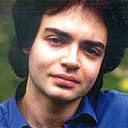
Even in his absence, Evgeny Kissin managed to dominate the Philharmonia's Royal Festival Hall programme. He supplied an apologetic, handwritten letter explaining his withdrawal from the concert (which followed the illness of conductor Emmanuel Krivine), and the stage announcement of his indisposition was greeted with ironic applause from one section of the audience. Kissin is the most polarising of pianists: you either love him or hate him. The misfortunes of Krivine and Kissin meant the audience was treated to a dazzling interpretation of Prokofiev's second piano concerto by two of the youngest stars of Russian music: pianist Alexander Melnikov and conductor Tugan Sokhiev. In his mid-20s, Sokhiev has already been appointed music director of the Welsh National Opera. What Melnikov lacks in Kissin's brute power, he makes up for with an innate musicality, and he brought a powerful lyricism to one of Prokofiev's most tortuous piano parts. In the scherzo second movement, he created a constant stream of fast figuration, a liquid accompaniment to the orchestra's imposing thematic material. Yet his performance was just as impressive in the bravura passages of the outer movements. Prokofiev himself described this concerto as one of his most demanding works technically, and the music scales vertiginous heights of virtuosity in the cadenzas of the first and last movements.
Melnikov dispatched his solo in the opening movement with ease, but what was even more impressive was the way he integrated the cadenza into the musical architecture of the whole concerto. Sokhiev's efficient direction drew precise and powerful playing from the Philharmonia in Glinka's madcap overture to Ruslan and Ludmilla. However, his performance of Ravel's orchestration of Mussorgsky's Pictures at an Exhibition was a disappointment, as the clinical coolness of his conducting deadened the fantasy of these delicate character pieces. He made the grotesque imagery of Mussorgsky's gnomes and catacombs sound twee rather than terrifying, and even the Great Gate of Kiev seemed shaky and insecure.

